Irresponsible Guy Blames Mental Health For Starving Friend's Pet Spider To Death
FunBear8523, a Reddit user, shared a post on the "AITA" subreddit, seeking opinions on a situation involving her pet jumping spider and a friend. FunBear8523 is studying zoology at university and has a pet spider that means a lot to her.
She was struggling with being away from home while her dad was in the hospital, so she asked her friend, who was also studying zoology, to look after the spider while she was gone. The friend agreed and even claimed to be an animal lover, so FunBear8523 provided him with all the equipment and food he needed to care for the spider.
FunBear8523 says she checked in on the spider regularly, and the friend assured her that it was healthy and active, though he never sent any pictures. However, just before Christmas, the friend told FunBear8523 that she had to come back and retrieve the spider.
Upon getting the spider back, FunBear8523 realized that it was near death, with its enclosure soaking wet and growing mold, and all of the food was dead. The friend admitted to lying about feeding the spider and taking care of it when FunBear8523 confronted him.
He claimed that he didn’t even feed the spider once during the five-week period he had her because he was in a bad mental state. FunBear8523 is torn between feeling that she should have been more responsible for her pet and feeling that her friend should not have agreed to look after the pet if he was unable to do so.
Here's how the AITA community responded to her post.
Here's OP's story.
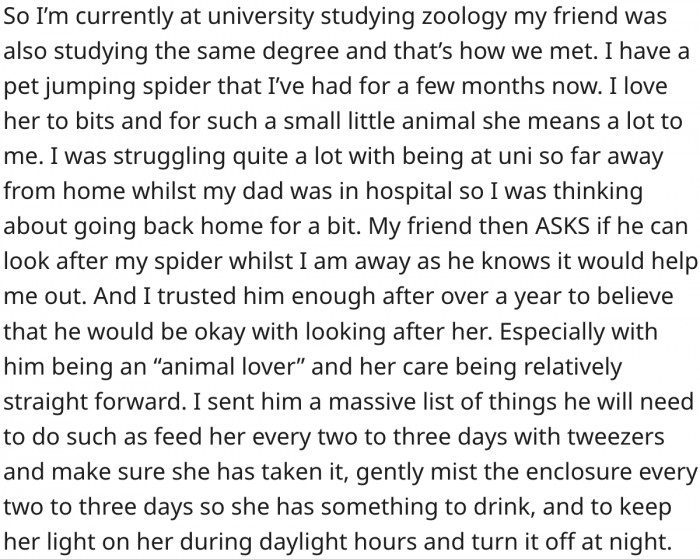
She couldn't believe what she saw in her pet's cage.

Was she wrong to confront him? Here's what Reddit thinks.
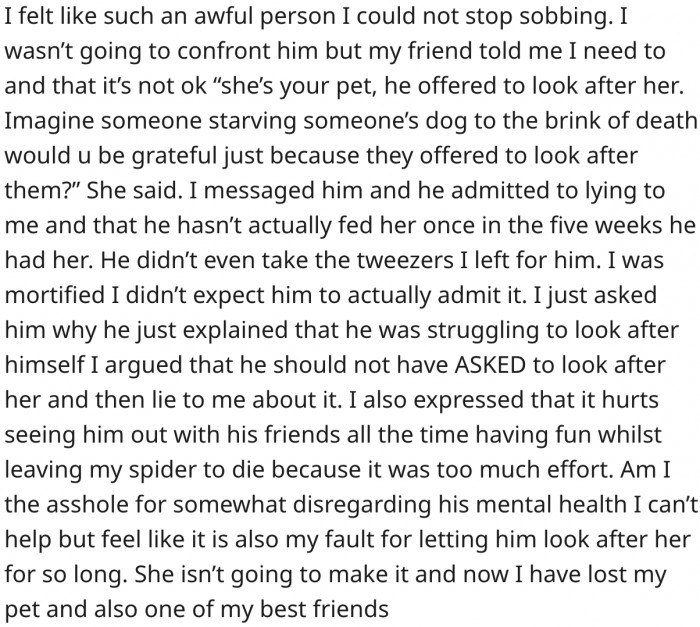
The Intersection of Mental Health and Responsibility
The tragic outcome of the pet spider's death raises important questions about responsibility and mental health. According to Dr. Ian Kerner, a licensed sex therapist and relationship expert, "Mental health challenges can significantly impact an individual's ability to care for others, as they may struggle with basic responsibilities." This situation highlights how the individual’s mental state may have influenced their capacity to provide adequate care for the pet, leading to dire consequences. As Dr. Kerner emphasizes, "Understanding the interplay between mental health and caregiving is crucial for preventing such tragedies."
1. Her friend should have been upfront about not being able to care for the spider.

2. Her friend has no valid reason for neglecting the spider.
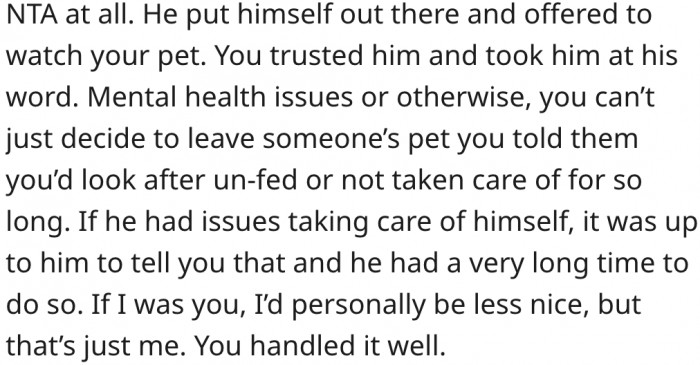
3. She should sever ties with her friend.
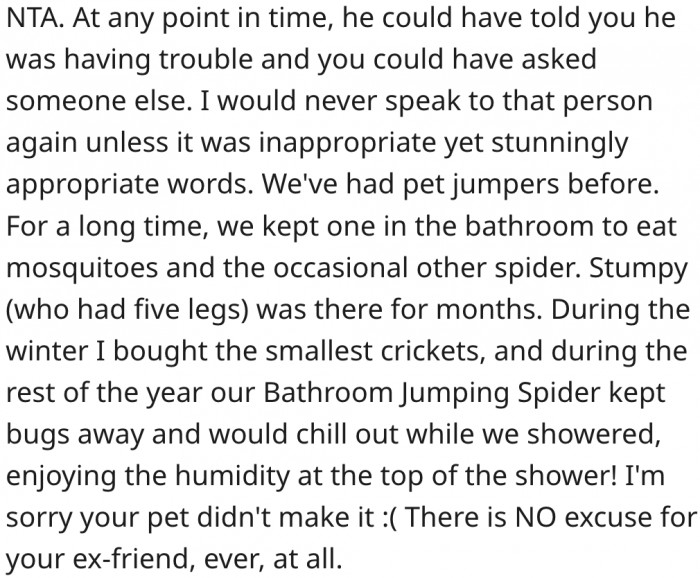
It's crucial to recognize that mental health conditions can impair judgment and decision-making capabilities. Studies show that individuals experiencing depression or anxiety may find it difficult to engage in routine tasks, including caring for pets. This inability can be attributed to cognitive overload or emotional exhaustion, which can significantly limit one's capacity to act responsibly.
4. Her friend had enough time to admit that they were unable to care for the spider.
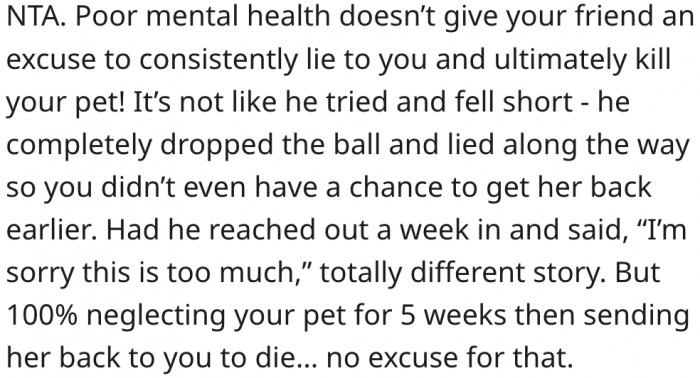
5. It makes no sense for her to feel that she's in the wrong.
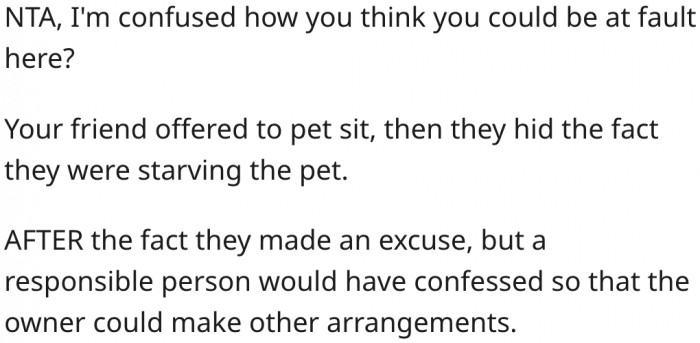
6. Her friend failed to keep their promise.

Understanding Pet Ownership Responsibilities
Pet ownership carries inherent responsibilities that can be overwhelming for some individuals. According to research published in the Journal of Applied Animal Welfare Science, the psychological burden of caring for pets can escalate during periods of mental instability. Owners must be aware of their limitations and seek support when needed to ensure the well-being of their animals.
7. Her friend was irresponsible.

8. Those who can't care for themselves shouldn't be trusted to care for others.

9. Her friend messed up and knows it.

Education on pet care is vital, especially for individuals who may struggle with mental health challenges. Programs designed to teach responsible pet ownership can help mitigate the risks associated with neglect. Furthermore, social support networks can play a crucial role in providing assistance and guidance, allowing individuals to navigate their responsibilities more effectively.
10. A spider does not qualify as a pet.
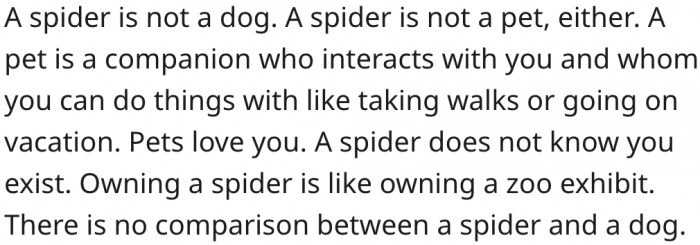
What do you think?
Honesty is a key aspect of building and maintaining strong relationships with friends and loved ones. When someone asks for assistance, it is important to be upfront about your ability to fulfill their request.
If you cannot fulfill their request, it is better to be honest and tell them early on rather than make promises you cannot keep. Neglecting to do so can lead to disappointment, mistrust, and even resentment in the relationship.
Being honest about your limitations not only protects the trust in your relationship but also shows respect for the person who made the request and gives them an opportunity to find alternative solutions. By being honest and transparent, you build stronger, more fulfilling relationships that are based on mutual trust and respect.
What do you think?
Practical Steps Towards Responsible Pet Care
For those facing mental health challenges, it’s essential to develop a support system that includes friends, family, or professionals who can assist with pet care. Research suggests that engaging in shared responsibilities can alleviate the burden and enhance the pet's quality of life. Additionally, using reminders or structured routines can help individuals stay on track with their caregiving duties, ensuring that the needs of their pets are met.
Psychological Analysis
This situation highlights the significant impact that mental health can have on responsibility. It's important to recognize that individuals facing mental health challenges may struggle with day-to-day tasks, including caring for pets. Providing support and understanding can make a substantial difference in ensuring that both individuals and their pets thrive.
Analysis generated by AI
Analysis & Alternative Approaches
In summary, the intersection of mental health and pet ownership responsibilities is complex and multifaceted. Understanding the challenges faced by individuals with mental health conditions can foster empathy and create opportunities for intervention. By leveraging support systems and educational resources, we can promote responsible pet ownership and enhance the well-being of both pets and their owners.



